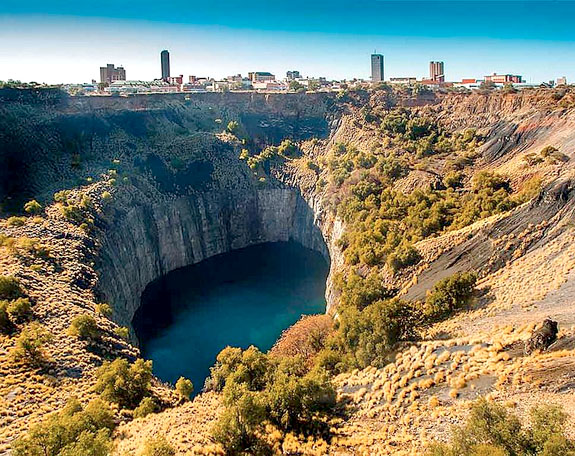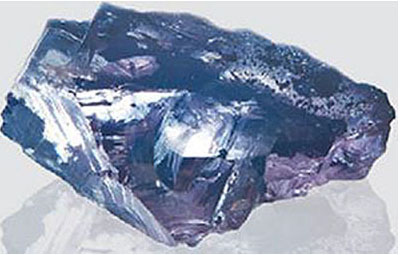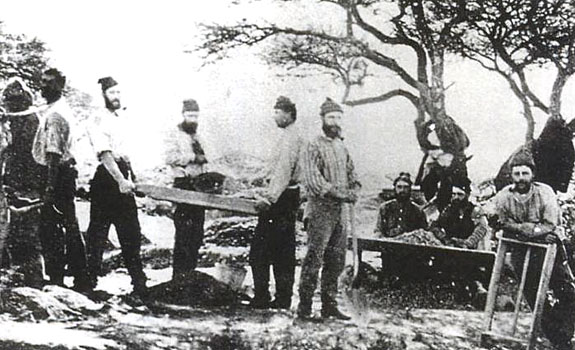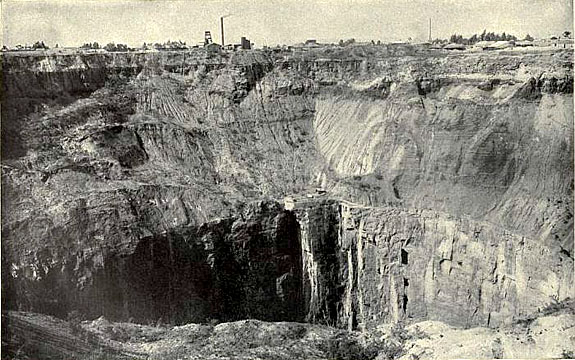May 26th, 2015
Discovered in 1871 and considered the world’s richest diamond source for nearly a century, De Beers’ Kimberley Mine (the “Big Hole”) is up for sale.

Although active mining at the Big Hole ended nine years ago, the mine in South Africa still recovers more than 700,000 carats per year by using advanced X-ray technology to sift through the tailings, or waste rock, that old-timers discarded generations ago.

Only three weeks ago, we reported on a super-rare 30.80-carat Kimberley Purple, a rough diamond that was salvaged at the diamond tailings plant in Kimberley. The gem could be worth more than $1 million per carat.

Originally, the Big Hole — which currently measures 700 feet deep and 1,500 feet in width — was not a hole at all. In 1871, an 83.5-carat diamond was found on the slopes of Colesberg Kopje, sparking a diamond rush in the area. Miners flocked to the site by the tens of thousands, and the hill at Colesberg Kopje quickly turned into a giant cavity, following the subterranean path of a diamond-laden kimberlite pipe.
The Big Hole is believed to be the largest hand-dug excavation on earth. At peak operation in the early 1900s it employed 50,000 laborers who used nothing more sophisticated than a pick and a spade to move more than 22 million tons of earth in their quest for diamonds.

The De Beers Group had planned to retire its Kimberley Mine operations in 2018, but now believes the tailings-recovery business can still be viable through 2030 — for the right operator.
“It’ll still be profitable in 10 years,” De Beers spokesman Tom Tweedy told The Wall Street Journal. “But the scale better suits a smaller, lower-cost operator.”
The company did not say how much it was seeking for the mine, but did report that the mine is generating hundreds of millions of dollars per year in revenue and more than $100 million in profit. De Beers hopes to conclude a deal within the next few months.
Englishman Cecil Rhodes founded De Beers in 1880. Based on the riches earned at the Kimberley, Rhodes controlled 90% of the world’s rough diamond supply by the time of his death in 1902.
Images: Kimberley Mine by Hein Waschefort [CC BY-SA 3.0] via Wikimedia Commons; Kimberley Purple via nationaljeweler.com (uncredited); Kimberley Mine in 1902 by Encyclopædia Britannica via Wikimedia Commons; Prospectors on Colesberg Kopje in 1871 via Wikimedia Commons.

Although active mining at the Big Hole ended nine years ago, the mine in South Africa still recovers more than 700,000 carats per year by using advanced X-ray technology to sift through the tailings, or waste rock, that old-timers discarded generations ago.

Only three weeks ago, we reported on a super-rare 30.80-carat Kimberley Purple, a rough diamond that was salvaged at the diamond tailings plant in Kimberley. The gem could be worth more than $1 million per carat.

Originally, the Big Hole — which currently measures 700 feet deep and 1,500 feet in width — was not a hole at all. In 1871, an 83.5-carat diamond was found on the slopes of Colesberg Kopje, sparking a diamond rush in the area. Miners flocked to the site by the tens of thousands, and the hill at Colesberg Kopje quickly turned into a giant cavity, following the subterranean path of a diamond-laden kimberlite pipe.
The Big Hole is believed to be the largest hand-dug excavation on earth. At peak operation in the early 1900s it employed 50,000 laborers who used nothing more sophisticated than a pick and a spade to move more than 22 million tons of earth in their quest for diamonds.

The De Beers Group had planned to retire its Kimberley Mine operations in 2018, but now believes the tailings-recovery business can still be viable through 2030 — for the right operator.
“It’ll still be profitable in 10 years,” De Beers spokesman Tom Tweedy told The Wall Street Journal. “But the scale better suits a smaller, lower-cost operator.”
The company did not say how much it was seeking for the mine, but did report that the mine is generating hundreds of millions of dollars per year in revenue and more than $100 million in profit. De Beers hopes to conclude a deal within the next few months.
Englishman Cecil Rhodes founded De Beers in 1880. Based on the riches earned at the Kimberley, Rhodes controlled 90% of the world’s rough diamond supply by the time of his death in 1902.
Images: Kimberley Mine by Hein Waschefort [CC BY-SA 3.0] via Wikimedia Commons; Kimberley Purple via nationaljeweler.com (uncredited); Kimberley Mine in 1902 by Encyclopædia Britannica via Wikimedia Commons; Prospectors on Colesberg Kopje in 1871 via Wikimedia Commons.



